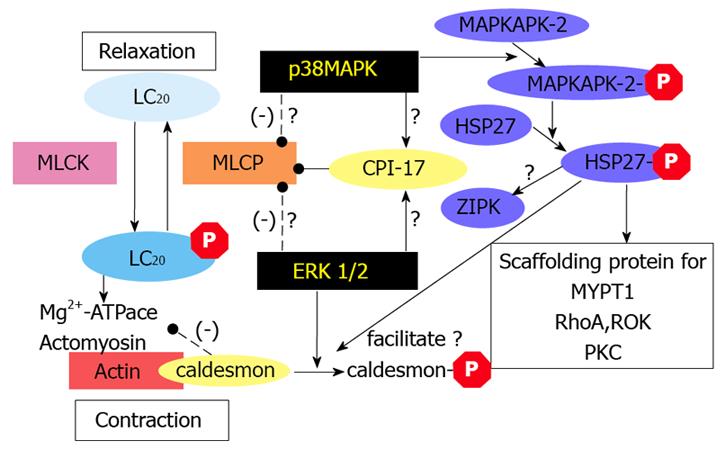Copyright
©2011 Baishideng Publishing Group Co.
World J Gastrointest Pathophysiol. Apr 15, 2011; 2(2): 19-25
Published online Apr 15, 2011. doi: 10.4291/wjgp.v2.i2.19
Published online Apr 15, 2011. doi: 10.4291/wjgp.v2.i2.19
Figure 2 Proposed mechanisms by which ERK1/2 and p38MAPK signaling pathways contribute to smooth muscle contraction.
MAPK pathways play important roles in modulating the contractile responses of normal and inflamed intestinal smooth muscles. MAPKs can alter the contractile activity of smooth muscle by (1) increasing the Mg2+-ATPase activity of myosin II, (2) phosphorylating caldesmon, a thin-filament associated protein, and promoting actin-myosin cross-bridges (3) phosphorylating HSP27 to reverse the inhibitory effects of caldesmon, or (4) directly regulating of myosin phosphatase activity. CPI-17: protein kinase C-potentiated inhibitory protein for protein phosphatase 1 of 17 kDa; ERK1/2: extracellular signal-regulated kinase 1/2; HSP27: phosphorylate heat shock protein; MAPKAPK-2: MAPK-activated protein kinase 2; LC20: 20 kDa myosin light chain; MLCK: myosin light chain kinase; MLCP: myosin light chain phosphatase; p38MAPK: p38 mitogen-activated protein kinase; PKC: protein kinase C; ROK: Rho-activated protein kinase; ZIPK: zipper-interacting protein kinase.
- Citation: Ihara E, Akiho H, Nakamura K, Turner SR, MacDonald JA. MAPKs represent novel therapeutic targets for gastrointestinal motility disorders. World J Gastrointest Pathophysiol 2011; 2(2): 19-25
- URL: https://www.wjgnet.com/2150-5330/full/v2/i2/19.htm
- DOI: https://dx.doi.org/10.4291/wjgp.v2.i2.19









